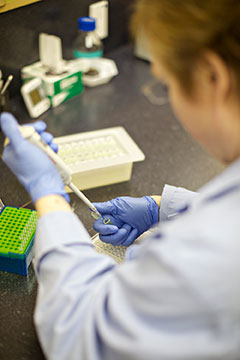
Aquaculture needs to play catch-up
May 21, 2020
By
Liza Mayer
 More economic analyses are needed to encourage the type of investment in fish breeding innovations, says a geneticist
Credit: BCSFA
More economic analyses are needed to encourage the type of investment in fish breeding innovations, says a geneticist
Credit: BCSFA
The aquaculture industry is sorely behind other types of farming when it comes to innovations that enhance animal breeding, but support for academic research in this area could help it catch up, says author and professor of Aquaculture at Louisiana State University, Dr. Greg Lutz.
Speaking at the Aquaculture Genetics online workshop organized by Auburn University on May 15, Lutz said the investment needed to apply the modern molecular methods required to help the industry advance remains largely in the purview of sectors that are big enough to attract them, such as salmon — and to a lesser extent — shrimp and tilapia.
“In some countries, there is a modest level of government support for such activities, but many researchers in many countries are forced to focus their efforts wherever the funding leads them. Perhaps the first research work that should be supported would involve more economic analyses in order to help build the confidence to encourage the type of investment these industries require,” he said.
He suggested that economic studies will assist policy makers and researchers to decide which interventions are most beneficial.
Workshop host Dr David Cline, an extension aquaculturist at Auburn University, said producers and policy makers often perceive genetics as a complicated and intimidating topic. “As a result, they may be reluctant to delve into the subject in spite of its increasing relevance,” he said.
Aquaculture has made massive improvements in terms of production systems, but those can only go so far, said Lutz. He said there’s also been huge progress in the field of nutrition but there is more room to grow.
He sees “tremendous gains” being made over the next 20 years in breeding innovations via genetic editing, which improve yields in animal protein production and industry sustainability.
“There are still a lot of things that mom-and-pop can do on their farm in terms of how they manage their breeding stock, how they do their selection, or if they want to cross distinct lines,” but innovations of this scale (genetic editing) will come from breeding companies, he said. “All the good fish are going to trickle down from these breeding companies.”
The Aquaculture Genetics live broadcast on Zoom attracted 300 participants worldwide and has been the most popular so far, said Cline. The next one currently on the calendar is scheduled for July 10th at 1pm central time. Kim Thompson, Director of the Seafood for the Future Program at the Aquarium of the Pacific, will discuss aquaculture perceptions and sustainable aquaculture. Registration is available – https://auburn.zoom.us/meeting/register/tJYlcOyvqzosEt0_k8DIPTyUspPAwD8CK3kE





